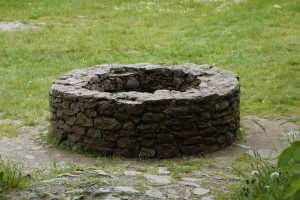
3rd Sunday of Lent: An Unexpected Lesson from the Woman at the Well
3rd Sunday of Lent, Year A
John 4:5-42
An Unexpected Lesson from the Woman at the Well
As I read the story of the Woman at the Well, I looked hard for a nugget, something I hadn’t noticed or heard before. With a little help from various commentaries, I picked up a couple. I had never paid attention to the fact that the woman leaves her jug at the well when she goes to tell the townspeople about her encounter with Jesus—she’s now a true disciple, leaving behind her old life. There were other details too, but none of them resonated in the way I hoped. I think I wanted to hear God speak directly to me in this gospel.
And then He did. What frees the woman in her interaction with Jesus? When she knows He is aware of her past (v.19) and yet He still loves her. Why do we keep secrets to begin with? To protect our reputation or the reputation of someone else. But what if, when the secret is out, our reputations are still intact? For humans, that’s almost impossible—often, at the very least, time is the only thing that can mend the tears in the fabric.
But with God, it’s different. He loves us, regardless. In part because He already knows us—the good and the bad—so He knows what He’s dealing with from the beginning. Humans aren’t so lucky. For us, revelations are just that, new information that we then have to assimilate. God doesn’t have that issue, and, even knowing everything, He still loves us.
That kind of love can be hard for humans to grapple with. We often haven’t experienced it, so we don’t know what to do with it. We can’t believe it could be real, so we still try to hide our faults, even from God, but even more importantly from ourselves. Lying to ourselves keeps us on a defensive edge all the time. We don’t know when we’ll be found out, and we have to be at the ready. We can’t relax.
That’s where the sacrament of Reconciliation comes in. Done effectively, Reconciliation encourages an evaluation of the self, but not for the purpose of listing sins. We’ve all got a laundry list worth of those. The purpose of a self-evaluation is the letting go of our secrets. Once we know (and accept) the bad, we can give it up to God. That’s when the healing begins. When we aren’t worried about being found out, there’s a lightness, a freedom, space to relax. We can finally just be the person God created us to be in the first place. We aren’t defensively trying to protect against being found out, because we are already known and yet still loved.
That’s what I finally learned from the Woman at the Well this year. To spend some time this Lent reflecting on what I am trying to hide from God (and from myself). To be brave enough to confront whatever it is and to let it go. To try to live a little lighter, a little more transparently. To be more free, like the woman, in my interactions with Jesus and maybe, just maybe, I’ll also be able to leave my metaphorical jar behind.


